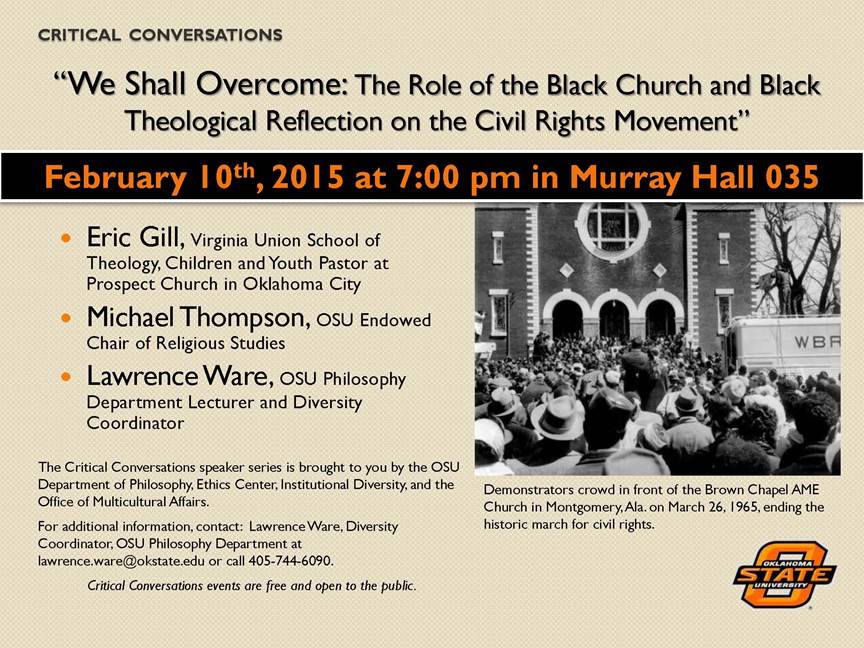
(source: Event)
So, I went to an interesting talk last night, and it raised a question for me that I would likely have tried to formulate for the panel, if it had not been a room full of students rather than (as I would have liked) a room full of interested scholars (and their students).
Michael Thompson, speaking from a white Southern Baptist perspective, laid out the general perspective shared by many Christians and evangelicals: that “the Jesus movement” had a “high moral standard” that led Christians to reject the exposure of infants, and ultimately to reject slavery, although Christians were certainly not consistently above reproach.
Eric Gill, speaking from the perspective of a scholar and youth pastor in “the Black Church,” argued that the black church as such had a “minimal role” in the Civil Rights Movement, for reasons essential to its role as an institution that organized both enslaved and segregated African-Americans into a community. His most accessible example, for me, was the demurral of most leaders of black churches in Alabama to join in desegregation activism, leaving the task to Martin Luther King, Jr., whose leadership in civil rights activism was contrary to a strong cultural principle that “youth don’t lead.”
Lawrence Ware, responding and moderating, expressed significant hesitation about accepting Gill’s thesis, given the persistence of “Reverend” in the names of civil rights leaders; and he asked Thompson what could be done. But it was in the course of Ware’s own response that I heard what, as it unfolded, made me want to ask a question.
Ware adopted the sense of “theological reflection” that emerges from Tillich or Ricoeur, suggesting that (as Gill had noted) the arrival of Black Liberation Theology in the work of James Cone was the theological dimension of the black church’s involvement in the civil rights movement. He noted that “lived experience is the prism” through which the sacred text is interpreted, so that “it is no surprise that the enslaved read the Bible differently than those who enslave them.” Given the significant number of black civil rights leaders who were also leaders in the black church, Ware thought it useful to “push back” against Gill’s thesis.
Gill’s defense, however, pointed out that the nature of the black church as a community institution could not help but be transformed by the civil-rights movement, and that there were significant trade-offs. On the one hand, the juxtaposition of all classes of African Americans in segregated cities made the church a unique institution, a “free space” in an unfree place. Oh the other hand, this interiorized understanding of freedom and a pietistic (Gill specifically spoke of “revivalistic piety”) spirituality made the black church reluctant, as an institution, to wholeheartedly support the dangerous outward-facing work that organizations like the NAACP, first, and SCLC, later, were calling for. In conversation, what Gill and Ware and Thompson could all agree on was that readings of the Bible–of the sayings of Jesus in the Gospels, but also of the Exodus narrative–provided much-needed spiritual and rhetorical resources for the civil rights movement, both within and without the black church. What Gill emphasized, however, was the retrospective relationship of the black church, as a whole, to the civil rights movement: only once the civil rights movement had transformed the culture in which the black church is an institution, and thus provided a need for “theological reflection” in the manner Ware described, was what seems like an obvious affinity of interest clear.
What I wanted to pose to the panel, had there been time to engage in a protracted discussion, was whether this was not a general pattern–in fact, whether their discussion had not re-enacted in brief a pattern evident throughout church history.
In North Africa in the 3rd and 4th centuries, Christians who were trying to remain faithful in the middle of truly violent fluctuations in the relationship of Christ and Caesar, Church and regime, and even bishop and bishop, were found in exile or in voluntary solitude, in the desert. In subsequent developments the Church recognized that the principles for which these were ostracized were principles already evident in the sacred text, waiting to be unfolded from the depositum fidei. Similar things may be said of the early movements of Franciscans (think of St. Francis unsuccessfully trying to evangelize the Muslims en masse) and Dominicans, friars determined to set right what was muddled in the heavily secularized Church of the day. Even the wounds in the Body of Christ caused by our denominations and divisions are, I think we may hope, one day going to prove to have stimulated prayer, reparation, and ressourcement that permits us to unfold more and more of the “faith once for all delivered” and yet to be fully realized in each of us and throughout the world.
So is it not all right to accept that, on the one hand, the resources given us in Christ are precisely those which we need in each crucial hour–as those Selma days surely were, for any American, and especially for those who braved death and torment to march for what’s right–while on the other hand recognizing that, insofar as we cannot fully discern the developments until they have been articulated in our circumstances, until lived experience has driven us to ressourcement, there is nothing too surprising, though it may be wrong and upsetting nonetheless, about the Church sometimes lagging in the particulars of worldly action, even as it preserves and proclaims precisely those resources without which we cannot hope to reach the Promised Land?
It was a great discussion to listen to, and well worth the time.
*[I disagree with some of the Biblical criticism employed, and rescind from some particular political opinions expressed.]